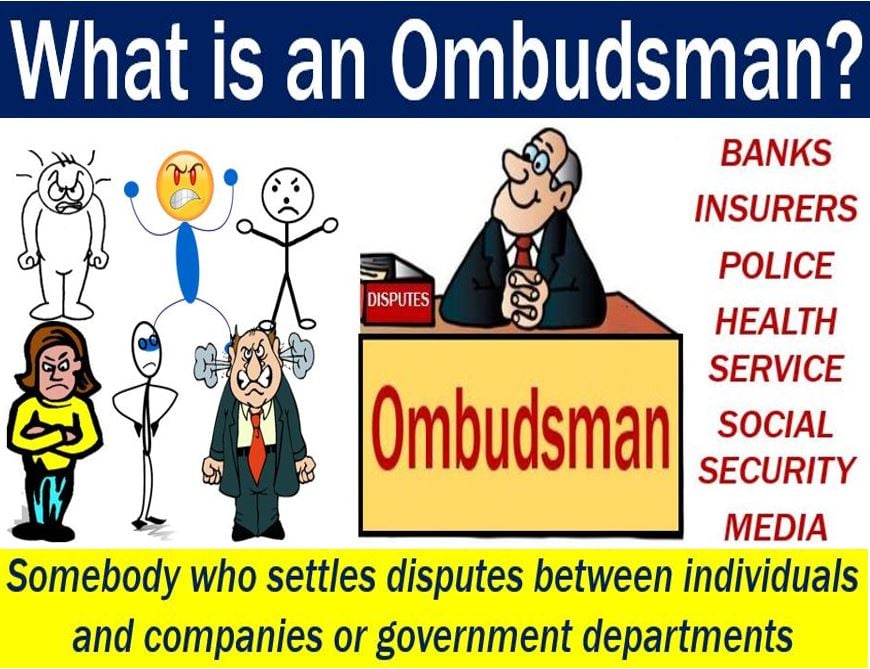An ombudsman is an official in charge of settling disputes between individuals and companies. The disputes may also be between a taxpayer and the government. In fact, there are dozens of types of disputes where an ombudsman may be necessary. We may also refer to this person as an ombuds or public advocate.
It is a free service.
Somebody may, for example, contract or hire an ombudsman against an insurance company. Perhaps that person felt that the insurance firm had not respected their rights.
People choose ombudsmen because they are impartial, fair, credible, confidential, and independent.
While some ombudsmen provide their service free of charge, others may receive payment.
Ombudsmen will first try to resolve the issue between the two disputing parties. The aim, initially, is to prevent having to resort to a formal investigation. In other words, they will try to conclude there and then.
According to the Ombudsman Association:
“Ombudsmen exist to deal with complaints from ordinary citizens and consumers about most public bodies and some services in the private sector.”

An ombudsman is similar to an arbitrator. However, arbitration resembles litigation, but in an informal and flexible process. The ombudsman is an independent, neutral, in-house professional.
Ombudsman is impartial
The ombudsman’s job involves comprehensively investigating and considering both parties’ arguments. This is necessary to achieve a fair solution. They will consider all circumstances and any relevant regulations.
Above all, ombudsmen must be thorough, fair, and impartial.
The ombudsman’s office will strive to solve each case. However, if they encounter systemic failures, they will seek change within the organization. A systemic failure affects the whole of an organization, rather than just parts of it.
If they encounter several similar or identical disputes, they will start a collective case to avoid excessive costs.
Nowadays, ombudsmen exist in the public and private sector. In the public sector, they handle complaints against government departments, local authorities, the health service, or any public body. In other words, any public body that is directly or indirectly subject to democratic accountability.
Ombudsman – the private sector
Ombudsmen deal with disputes against businesses. However, in these cases, the businesses are not subject to democratic accountability. They may issue decisions that force changes beneficial for all parties.
Ombudsmen work to help improve effectiveness and efficiency. Their decisions, they hope, help improve the quality of service of government departments and companies.
The UK’s Ombudsman Association says that there are three schemes for dealing with complaints in the private sector:
– Statutory: in other words, established by statute. This gives ombudsmen a compulsory jurisdiction over specific types of businesses. For example, there are financial ombudsmen, legal ombudsmen, etc.
– Underpinned by State: certain types of businesses must have an ombudsman scheme. The scheme has to meet certain minimum criteria.
– Voluntary: people set up this type of scheme voluntarily. In fact, many of them emerge as a result of consumer or government pressure.
Ombudsman compound words
There are many compound words and phrases with the word ‘ombudsman.’ Here are some of them:
-
Ombudsman Office
The physical location or administrative unit where an ombudsman carries out their duties, often serving as a point of contact for dispute resolution.
-
Ombudsman Program
A structured initiative or set of activities designed to address complaints, disputes, or conflicts between individuals and organizations.
-
Ombudsman Services
Various services provided by an ombudsman, including mediation, investigation, and resolution of complaints or issues within an organization.
-
Ombudsman System
The organizational framework that facilitates the functioning of ombudsman services and ensures fair and impartial handling of disputes or grievances.
-
Ombudsman Investigation
A thorough examination or inquiry conducted by an ombudsman into a specific complaint or issue to gather relevant information and reach a resolution.
-
Ombudsman Report
A comprehensive document detailing the findings, recommendations, and conclusions resulting from an ombudsman’s investigation or review of a particular case.
-
Ombudsman Role
The responsibilities, duties, and functions assigned to an ombudsman, typically involving the impartial handling of disputes, grievances, or conflicts within an organization.
-
Ombudsman Committee
A group of individuals tasked with overseeing the activities of the ombudsman’s office and ensuring the effective implementation of ombudsman policies and procedures.
-
Ombudsman Case
A specific complaint, issue, or dispute brought to the attention of an ombudsman for resolution or mediation.
-
Ombudsman Jurisdiction
The scope or extent of authority within which an ombudsman can operate, addressing complaints or disputes within a particular organization, industry, or sector.
-
Ombudsman Resolution
The outcome or decision reached by an ombudsman following an investigation or mediation process, aiming to resolve conflicts or issues to the satisfaction of all parties involved.
-
Ombudsman Confidentiality
The principle ensuring that sensitive information shared with an ombudsman during the complaint resolution process remains private and is not disclosed without the consent of the parties involved.
-
Ombudsman Advocacy
The act of representing and advocating for the interests and rights of individuals or groups who have filed complaints or encountered issues within an organization.
-
Ombudsman Ethics
The ethical principles and standards guiding the behavior and actions of an ombudsman, emphasizing integrity, neutrality, and fairness in handling disputes and maintaining confidentiality.
-
Ombudsman Transparency
The practice of ensuring openness and clarity in the processes and procedures followed by an ombudsman, promoting trust and accountability in resolving complaints and conflicts.
Video – What is an ombudsman?
What our video in our sister YouTube channel Marketing Business Network which explains what an ombudsman is.
